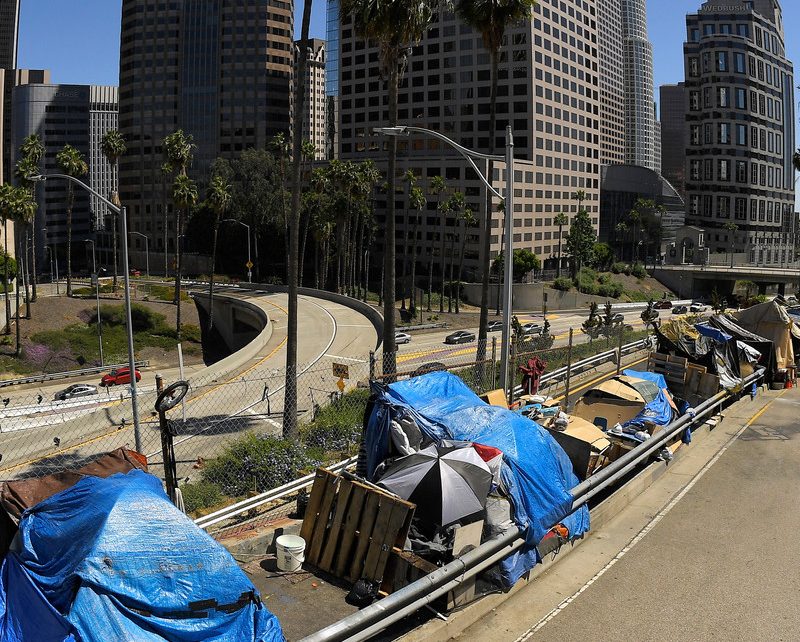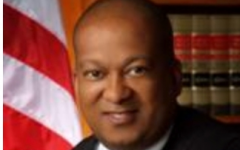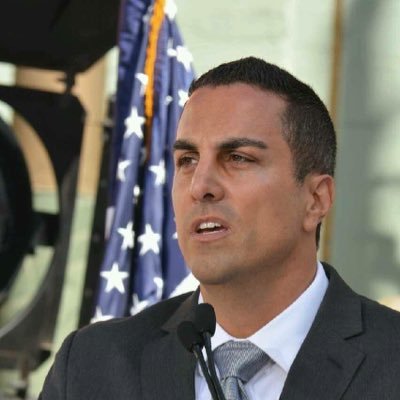
A homeless camp near a Freeway in Los Angeles. (Photo: Youtube)
U.S. District Court Judge Carter Faces Historic Decision on Homeless
An injunction would be first step towards placing LA City and County into court-supervised receivership to more decisively address homeless issues
By Edward Ring, March 26, 2021 4:09 pm
By Soledad Ursua and Edward Ring
In March 2020 a coalition of downtown businesses and homeowners filed a lawsuit against the City and County of Los Angeles, arguing that conditions on the streets of Los Angeles are inhumane, and tax money spent on homeless response has been wasted. After a year of hearings without substantial progress, on March 4, 2021, the coalition submitted a notice of intent with the court to file a Preliminary Injunction, which would require thousands of new beds in the coming months to be immediately paired with available public spaces.
It is possible that the judge on the case, U.S. District Judge David O. Carter, who is an outspoken critic of how the City and County have handled the homeless crisis, will proceed with the injunction. This could happen any day. If Judge Carter issues the injunction, it would be the first step towards placing the City and County into a court-supervised receivership to more decisively address homeless issues.
Receivership is not a new concept, and has been invoked in California previously. In 2005, Federal District Judge Thelton Henderson put the California state prison health care system into receivership. After months of consent decrees, hearings, expert testimony and negotiation, Judge Henderson commented on the California prison health care system’s “depravity” and ruled that it violated the Constitution’s Eighth Amendment prohibition against cruel and unusual punishment.
Judge Henderson stated, “The Court is simply at the end of the road with nowhere else to turn. Indeed, it would be fair to say that the Receivership is being imposed on the Court, rather than on the State, for it is the State’s abdication of responsibility that has led to the current crisis.”
Today’s homelessness crisis is a chilling parallel, and the City and County’s inability to act has exacerbated this humanitarian crisis and compels the courts to intervene.
Judge Carter is already going down the road of putting the City and County into a form of receivership. Options he may consider fall into two broad categories. First, how to find immediate temporary shelter for tens of thousands of unsheltered homeless living in Los Angeles County. Second, how to review and restructure the financial models that have been tried and have failed to solve the problem
Immediate Shelter Options
Judge Carter should mandate the many tax-exempt colleges and universities that receive state and federal funding to provide immediate space on their campuses to house the homeless. Los Angeles County has dozens of publicly funded colleges and universities within its boundaries, with many more in the surrounding region. Just the University of California campuses in Southern California include UCLA, UC Irvine, UC Riverside, UC Santa Barbara, and UC San Diego.
Beyond its world class public universities, the Southern California region also includes the following private universities which are nonetheless both federally funded and tax exempt: the University of Southern California, Pepperdine University, and Loyola Marymount University. The many state colleges include Cal State Los Angeles, Cal State Long Beach, Cal State Fullerton, and Cal State Northridge. Additionally, there are several community colleges located in Los Angeles County. Altogether, there are about 230 colleges and universities in or near Los Angeles.
In an effort to preserve social justice, and to advocate for the values that all of these colleges and universities share, the universities and colleges that have the highest admission standards and charge the highest tuition should provide shelter to the greatest number of unsheltered individuals.
Using UCLA as an example, one can immediately observe that they have world class dormitories; a plethora of buildings – many of which stand vacant – health and fitness equipment; sports, training and rehabilitation staff; an abundant supply of underused land and open space; parking lots for RVs; campus security; student medical facilities with world class doctors that already accept Medicare and MediCal patients; mental health and social services training programs, and much more. The homeless that were placed on these campuses could also enroll in classes to further their education and ability to become productively employed.
Many state-government subsidies for higher education are still not back to the levels they were prior to the 2009 recession, much less prior to COVID19. At the same time, more than ever students are struggling with college debt. To cope with these financial challenges, some universities are already considering developing a new source of income by building senior living facilities on or near their campuses. Universities trying to cope with state budget cuts have also built hotels and other real-estate developments on their campuses. Designating these schools as part of a national homeless shelter project would provide a new line of revenue during this era of tight budgets.
Another option is to use federally owned land such as the Los Angeles International Airport. Under Title V of the McKinney-Vento Homeless Assistance Act, the federal government is obligated to lease or deed underutilized federal property to local governments for the specific purpose of homeless assistance. LAX is a great opportunity to use federal land during the COVID19 pandemic, on land which is underutilized since travel has diminished. At nearly 3,000 acres, surely this sprawling property has areas, perhaps in the emptier reaches of its vast parking areas, where thousands of homeless people can find shelter.
Finally, underutilized city and county owned property could be put to immediate use for the homeless. The Los Angeles City Controller has recently identified 13,948 separate properties within the City owned by various public entities, many of which are vacant or underutilized. Controller Galperin has a portal to identify City owned properties.
The infrastructure already exists on public lands. An injunction from Judge Carter might be exactly what is needed for progressive City Councilmembers, such as Mike Bonin, to give up the idea of “seizing” private property to solve the homeless problem, instead forcing them to use publicly owned land and buildings that are already available.
Make Homelessness Less Profitable
In addition to identifying shelter opportunities, Judge Carter must do the following actions to ensure that this problem is solved– these may be the most important steps besides the simple solution of finding locations.
Reallocate Prop. HHH Funds: Reallocate funds from homeless housing projects which are excessive in cost. Under Prop. HHH, passed by voters in 2016, City officials were authorized to issue $1.2 billion in general obligation bonds to partially subsidize the development of up to 10,000 supportive housing units for individuals and families experiencing homelessness.
An Audit by LA Controller Ron Galperin showed that the average cost of such projects was $531,000 per unit, not including the cost of land. These units took between three and five years to build, and 30-60 percent of funds went towards “soft” costs such as fees, consultants and financing. Four years after HHH’s passage, only 489 units are ready for occupancy, and most of those under construction will not be ready until 2024. Today, less than $400 million of the $1.2 billion in HHH-generated bond money has been earmarked or spent.
Prop. HHH funds should be redirected towards shovel-ready projects, and a cap on the cost per unit should be imposed, with any project in excess stripped of funding. As per the HHH Audit- The City’s Comprehensive Homelessness Strategy (January 2016) estimated that the cost of building each studio/one-bedroom supportive housing unit would be $350,000 and a two-bedroom unit or larger would cost $414,000. Even these costs are excessive, and should be a worst case cap, not a target to be exceeded.
Another way to ensure Prop. HHH funds are not wasted would be to impose a clause that states that the HHH funding can only go to hard costs, meaning that none would go to soft costs or consultants, which are in the 30-60% range. Similarly, Prop. HHH funds should not be used towards developers fees.
Finally, Prop. HHH funds should be able to go towards non-permanent construction solutions. As it is, HHH funds can only go to new construction costs, meaning fast and ready solutions like SHARE! Housing are not even an option. These are practical steps Judge Carter may consider in order to get some actual mileage out of Prop. HHH, instead of what has happened to-date, which is a total exploitation by the Homeless Industrial Complex.
Audit Homeless Service Providers: Judge Carter should require a third party audit of the service providers that receive Los Angeles County Measure H funding, approved by voters in 2017 and allocating $470 million annually to pay for services for the homeless.
These providers are supposed to offer mental health, substance abuse treatment, health care, job training, transportation, outreach, and prevention services to the homeless. An audit would review their contracts and assess their performance. No one has ever adequately held these service providers accountable.
Apply Federal Rules to Campaign Donations: Judge Carter should put an end to pay-to-play schemes. For example, he may apply Section 206(4) of the Investment Advisers Act of 1940 to all industries that partake in municipal contracts, requiring that investment advisers are subject to a two-year timeout from providing compensatory advisory services or political contributions.
As it is, local elected officials accept campaign donations from special interest groups, and, coincidentally, give them the rights to large redevelopment projects. This could potentially be a pay-to-play scheme. These groups are not registered as investment advisers, yet because they are soliciting real estate projects to the councilmembers, in effect they are providing investment advisory services to municipalities.
Why should investment advisers have to register and adhere to campaign finance restrictions in the private sector, but not in the public sector? In the private sector, even an individual employee making a political contribution using personal funds would trigger this requirement for the entire company. Holding local elected officials to the same rules as in the private sector will eliminate obvious conflicts of interest, and make the bidding process for homeless projects and services more competitive.
For example, high ranking officials at People Assisting the Homeless (PATH), including its CEO, make political contributions to Los Angeles city councilmembers. This practice should be subjected to higher level scrutiny and regulation.
Consider Using Contempt of Court to Compel Action: Judge Carter should not hesitate to put elected officials in contempt of court if they fail to offer immediate solutions. Judge Carter certainly realizes that he is dealing with career politicians who may only with difficulty balance the needs of the community with their desire to be re-elected. To put a councilmember in contempt of court would ruin an elected official’s political future. It is time to hold them accountable and this may be the only way to ensure that they take decisive action.
All of these recommendations for Judge Carter are intended to offer ways to provide immediate shelter for the homeless, and also to put in place accountability and oversight practices in place to remove the incentives that attract bad actors and pay-to-play schemes.
Both of these objectives – to allocate city, county, state or federal land for use as homeless shelters, and to restructure the financial models that fund homeless services to make homelessness less profitable for special interests – are essential in order to move towards a lasting solution that helps the homeless and respects the taxpaying residents of Los Angeles.
Soledad Ursua is a principal at Orinoco Equities. She is a Los Angeles native, currently living in Venice Beach.
- Ringside: Reversing California’s Policies of Scarcity - January 8, 2026
- Ringside: What is the Future of California’s Republican Party? - December 31, 2025
- Ringside: CA GOP Just Blew $46 Million for Nothing – Here’s How They Can Avoid Repeating That Mistake in 2026 - December 24, 2025






Hopeful news and excellent suggestions offered here addressing the financial aspect and the accountability aspect. Maybe we will actually be able to move beyond the Homeless Industrial Complex. Could it happen? I especially liked the suggestion that Judge Carter consider contempt of court to stay on top of the players, hauling them back into court if they are not following through on what has been ordered. This seems key. Fingers crossed on all of this. Thank you Edward Ring for providing this roadmap of suggestions and for all of your policy work on this important subject.
I neglected to thank Soledad Ursua for her contribution to this article as well as for her good work as an activist in Venice.
Edward Ring has really been doing good work on the Homeless Industrial Complex issue. Very good analysis – and I think Ring is right in terms of framing it as pay-to-play with existing public investment.
Another issue I would look at is the General Assistance program. It seems to me that G/A grants should be sufficient to check into a residence hotel or a flophouse – we need to appraise the low-end/slum stock and see why this isn’t filling the niche it used to serve.
fantastic ideas. we should definitely stop paying the Poverty Pimps.
How many of these homeless are just lazy? They can be arrested for loitering, vagrancy, and whatever public safety laws . Arrest and give a warning the second arrest will be a long term in the bighouse. Identfy non CA residents. Go to jail or take a bus back to the cold states. Treat the dopers like the AAA 12 step program. Dope dealers should be given a very severe term in the big house. Have a bounty reward(one million$) and protect program giving information for the arrest of these murderers.
You make too much sense for anyone in government to follow what you say! Enforce the law and lots of this will go away. Providing the “homeless” with all their needs, and many of their wants, is absolutely stupid! Why would they want to improve their lives if they are taken care of without any effort on their part? The more that is given to them, the worse the problem becomes and more and more join up.